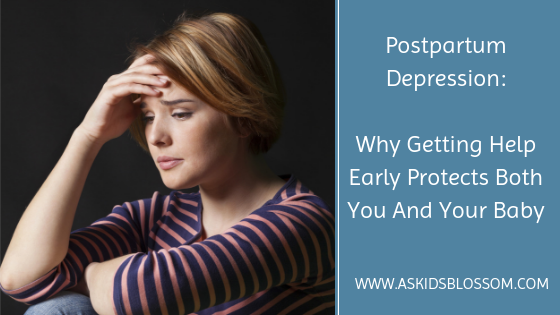For most women, the time after having a baby is filled with a lot of emotional ups and downs. Your hormones are all over the place and you are adjusting to having a brand new person to care for, to say nothing of the physical recovery that your body is going through!
And although having a new baby is an amazingly joyful experience, many women experience depressive symptoms during this time. In fact, according to a study from the University of Michigan Medical School, the “baby blues” affects 30-75% of new mothers. It is such a common occurrence that there are hundreds of books on the topic.
What is Postpartum Depression?
During the postpartum phase, many women experience mood swings, feelings of sadness, crying/weeping for no reason, anxiety, fatigue, insomnia, irritability, restlessness, and poor concentration. For the majority of women, these symptoms ease up after about 2 weeks without any specific treatment. For some women, more serious postpartum depression (PPD) symptoms can develop. However, since mild depression during the postpartum phase is quite common, some women fail to seek help when they really do need it.
Getting help and treatment for PPD is really important, not only for the mother’s sake but for her child’s sake as well. The early interactions between parents and children really matter and have a deep and lasting effect on the child. If a mother is struggling with PPD, it can make bonding with her baby harder. There are a number of studies on these effects; I have linked them at the end of the article if you are interested in looking through them.
Effect of Postpartum Depression on Children
Some of the effects that PPD can have on children include:
-
Withdrawal in infancy
-
Disorganized or insecure attachment
-
Delayed cognitive and language development
-
Behavior problems
-
Depression
-
Anxiety
-
Lower IQ Scores
Several studies indicate the PPD can have a lasting effect on children, including drug use, alcoholism, and ADHD in teenagers. PPD can affect the mother-child relationship even into adulthood, and one study even suggests that PPD can affect the mother-GRANDCHILD relationship, indicating that PPD can have multi-generational effects!
Before you panic that a few depressive symptoms during the first few days or weeks of infancy are going to scar your child for life, it’s important to note that studies have found that the more persistent and severe the PPD, the more likely it is that children will experience negative consequences. That is why it is so important to seek help as soon as you need it!
Be honest with your care provider at your follow up appointments. They have experience with speaking to postpartum women. They can provide help and next steps if you are honest with how you are feeling. Speaking with your health care provider is the BEST way to be evaluated, but there are a number of online screening tests that you can take as well.
Postpartum Self-care
Taking care of yourself during the postpartum period is so important, not just for you but for your baby as well! Some things that you can do include:
-
Rest
-
Drink plenty of water
-
Eat a healthy diet
-
Get some fresh air
-
Keep a journal and/or talk to a trusted friend about your feelings
-
Delegate tasks to those that want to help (meal prep, caring for older children, grocery shopping, etc)
One really easy way to take care of yourself is to take meal planning and prepping completely off the table. There are a number of different services that offer meal delivery- from ready-made meals that are delivered to boxes with easy to follow recipe cards and pre-measured ingredients. Two that I like are JingMommy and Blue Apron. This article from Motherly also has some great recommendations.
If you are having trouble adjusting to life with a new baby, and are unsure what your options are, I highly recommend that you reach out to your OB/GYN. If you are struggling with general parenting concerns, I would love to help! Please feel free to reach out for a free consultation.
Studies included in the research for this article:
-
Postnatal depression has a life-long impact on mother-child relations
-
Postnatal depression has greater impact on children’s development when it is persistent and severe
-
Children Can Also Suffer When Their Mothers Have Postpartum Depression
If you liked reading Postpartum Depression: Early Help Protects Both You and Your Baby, you might also like:
10 Things to Do With Kids Every Day
7 Ways How To Get Your Baby To Talk Earlier
